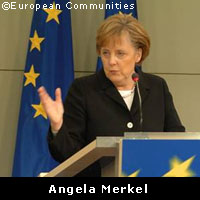Angela Merkel: Germany's Science Chancellor
Only two countries within the EU have a lower percentage of women scientists occupying A Grade posts than Germany. It is ironic then that the person with the biggest A Grade job of them all, that of German Chancellor, is a woman who worked as a scientist prior to entering politics. Angela Merkel was born in 1954 in Hamburg, but moved in the same year to East Germany, then part of the Soviet Union. She attended the University of Leipzig, where she studied physics, and then the Berlin Academy of Sciences, which she left with a PhD in physical chemistry. Dr Merkel then pursued a career in science, carrying out research into the decay of hydrocarbon molecules and writing papers for an East German science journal. Following the fall of the wall in 1989, Dr Merkel turned her back on a career in science, instead embracing politics. She won her first parliamentary seat in 1990, becoming Minister for Women and Youth. She then moved portfolios to Environment and Reactor Safety, and became party leader for the Christian Democratic Union (CDU) in 2000. In 2005 she became Germany's first woman - and first scientist - chancellor, and by 2007 was being described as the most powerful woman in the world. While she may not now be working in research, she has remained a strong advocate of science. As Dr Merkel is the leader of the EU's largest Member State, and the current President of the European Council, European science is also likely to benefit from this enthusiasm for science. 'The German government recognises that our future lies in a knowledge-based society [...]. That is why the promotion of science, research, and innovation is one of my top priorities,' wrote the Chancellor in the journal Science in July 2006. At the recent launch of the European Research Council (ERC) in Berlin, the Chancellor spoke enthusiastically and knowledgeably about the new initiative for a full 25 minutes - something that not every European head of state or government would manage. The ERC 'will, I hope, bundle the excellent research in the Member States into a 'Champions League' of research [...]. We are doing this out of the understanding that research and new technologies are the mainspring of economic dynamism, the foundations, for being able to expand Europe's economy, maintain and increase our prosperity and be competitive worldwide,' she said. Dr Merkel is also attempting to coax other EU Member States into embracing new technologies in order to slow climate change. She would like to make the EU's greenhouse gas targets more ambitious, moving the goalpost from a 20% cut by 2020 to a 30% cut. The Presidency would also like to raise the raise the target for the percentage of total power generation coming from renewable sources to 20%. The current figure is 6.5%. Dr Merkel believes that setting these targets would allow Europe to become a technological pioneer in the energy sector. On international women's day, what better role model could women scientists and students have as they contemplate a career in research?
Countries
Germany



